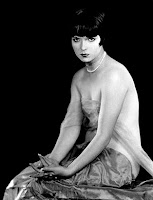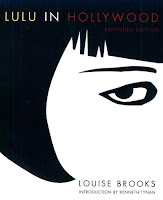According to Davis S. Cohen in Variety, and Thomas Gladysz (founder of the Louise Brooks Society) at Examiner.com, the silent film star's private journals are being unveiled after a 25-year moratorium. Says Cohen:
Brooks kept private journals from 1956 until her death in 1985, and bequeathed them to the George Eastman House with instructions they remain sealed for 25 years.
That date passed in August, and Eastman staffers have been poring over the journals before making them available to the public.
 I lived in Rochester, NY years ago, working as the planetarium Astronomer Intern at the Rochester Museum and Science Center, just a few blocks from the George Eastman House International Museum of Photography and Film. I visited the Eastman House occasionally, though not as often, or with the depth of research, that I now wish I had.
I lived in Rochester, NY years ago, working as the planetarium Astronomer Intern at the Rochester Museum and Science Center, just a few blocks from the George Eastman House International Museum of Photography and Film. I visited the Eastman House occasionally, though not as often, or with the depth of research, that I now wish I had.Brooks was a Rochester resident in her last years. She died years before I arrived, and I didn't even know she had lived there until well after I made my next career move to Portland, Oregon. It was there that my life-long love of early cinema broadened to embrace Brooks the first time I saw and wrote about Pandora's Box.
Her relationship with the Eastman House was more than just a casual accident of geography. As summarized in her Wikipedia biography, in 1956...
... James Card, the film curator for the George Eastman House, discovered Louise living as a recluse in New York City about this time, and persuaded her to move to Rochester, New York to be near the George Eastman House film collection. With his help, she became a noted film writer in her own right. A collection of her witty and cogent writings, Lulu in Hollywood, was published in 1982.
I have a copy of Lulu in Hollywood, of course, and can affirm her reputation as a damn fine writer, and as a candid, observant critic with a sharp eye and intellect to go along with her sharp tongue.
As evidenced by the Variety news, these newly unlocked private journals include further reviews and commentary about the Hollywood set, which she had abandoned with some disgust in 1938. For instance, after a 1957 screen of Anna Christie starring Greta Garbo (with whom the omnisexual Brooks once had a one-night affair), she wrote of Garbo's performance: "She strains terribly... Is made to read line on top of line without pauses for mental transitions."
It's an observation that shores up my own thoughts about Brooks' striking, before-its-time naturalism on screen.
As evidenced by the Variety news, these newly unlocked private journals include further reviews and commentary about the Hollywood set, which she had abandoned with some disgust in 1938. For instance, after a 1957 screen of Anna Christie starring Greta Garbo (with whom the omnisexual Brooks once had a one-night affair), she wrote of Garbo's performance: "She strains terribly... Is made to read line on top of line without pauses for mental transitions."
It's an observation that shores up my own thoughts about Brooks' striking, before-its-time naturalism on screen.
I wonder what else we'll see in the journals, assuming that they're going to be published unabridged. Hers was a life packed with more private drama than you usually find outside an HBO series, and much of it wouldn't exactly make what you'd call "family reading." She was graced with beauty, smarts, and talent that seemed to flow naturally from every cell in her body, yet as I wrote in that other blog post:
As an actress, not to mention as an unapologetic sexual and professional maverick, she was ambitious but reckless. Cocksure but difficult to the point of self-destructive. Independent, emancipated, and willful but too damn temperamental and mercurial to commit to any situation — jobs, husbands, lovers, Hollywood studios — long enough to really get serious roots dug in. She described herself as "a born loner, who was temporarily deflected from the hermit's path by a career in the theatre and films."
I'm hoping we get more of that Brooksie in these journals too. After all, the instructions to leave them sealed for 25 years suggests that there's something there besides opinions of performers and performances, right?
Although I'll always wish she'd lived long enough in Rochester for me to seek her out and meet her once I got there, I'll be looking forward to reading these journals and pretending that that's how it happened.
Further reading: Senses of Cinema: Lulu in Rochester: Louise Brooks and the cinema screen as a tabula rasa
Music: The Hollies, "Long Cool Woman (In A Black Dress)"
Near at hand: Kai's current favorite toy, a.k.a. "Cow"



